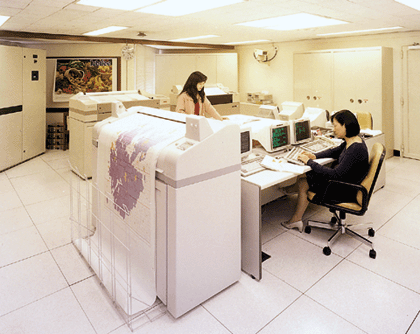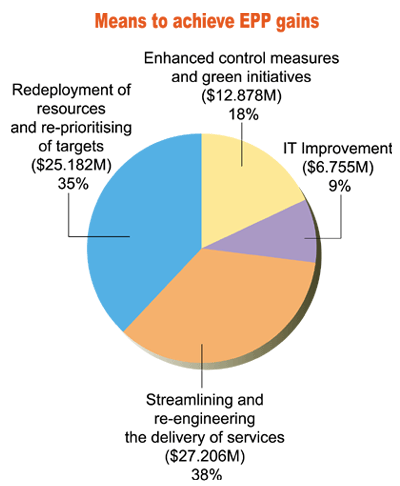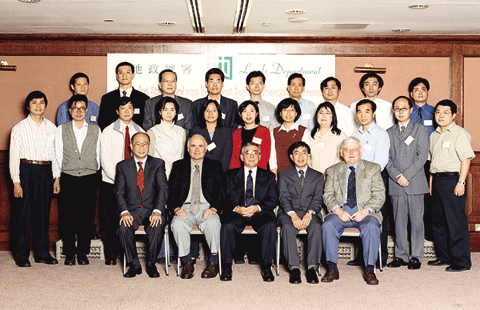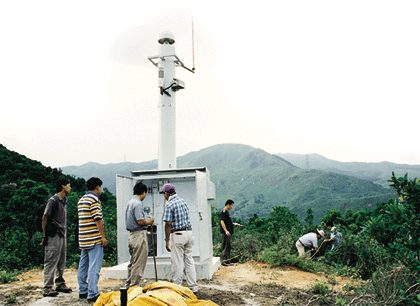- With full support and active participation of all staff, we are
confident that we will achieve the target savings of the Enhanced
Productivity Programme (EPP) while continuing to provide to the public
the highest quality of services in land administration which is the
vision of the department.
-
- Concerted staff effort is the driving force to achieve the department's
vision, missions, and commitment in EPP. We need our staff's participation
and have been working hard to provide them the most desirable working
environment, equipment and supporting facilities to meet our targets.
Under the EPP, we focus not only on saving money but also on spending
wisely and effectively with a view to improving office environment,
equipment and information technology systems, including facilities
to enhance occupational safety and health, and, equally important,
showing recognition to staff with outstanding performance in particular
their contributions towards enhanced productivity. This has been proved
to be an effective management approach to gain support of our staff
and maintain their momentum to enhance productivity and professionalism.
-
- To make our staff aware of the progress on EPP, we keep them and
their associations informed of our EPP policy and initiatives through
regular meetings and the Departmental Consultative Committee meetings.
The Department has been striving for enhanced productivity and professionalism
under four main areas which include streamlining and re-engineering
the delivery of services, better redeployment of resources and re-prioritising
targets and work, use of enhanced information technology, and effective
use of resources under enhanced control measures and green initiatives.
(i) Streamlining and Re-engineering the Delivery
of Services
- Processing of Small House Applications
The Village Improvement and Control Section and the New Territories
District Lands Offices of the Land Administration Office (LAO) worked
together to streamline procedures and re-engineer the processing of
the Small House applications. A workshop approach (which pools resources
in case processing) and a new system of interviews and site visits
have also been implemented. As a result, we are able to shorten the
average processing time of the Small House grants for the more straight
forward cases.
Clearance of Black Spots in New Territories
The Black Spots Task Force of the LAO has been achieving an above
target clearance performance in the past years through better planned
and co-ordinated programmes for site inspection of black spots and
follow-up action including land control and grant of short term tenancies
or short term waivers.
Land Valuation
The Valuation Section of the LAO has introduced an improved system
of analysing the nature of land transactions to improve the efficiency
and accuracy of the valuation process in conjunction with streamlined
procedures for land valuation analysis.
Updating of Map Database
To enhance the quality and content of the mapping database to meet
the rapid and dynamic development of Hong Kong, a comprehensive map
updating exercise was carried out by the Survey and Mapping Office
(SMO) in 2000. With the help of aerial photographs coupled with site
inspections by survey supporting staff, map updating work has been
streamlined and the efficiency has been greatly enhanced.
Grant of Deeds of Mutual Covenant Approvals
The Legal Advisory and Conveyancing Office (LACO) has streamlined
procedures for processing of the approvals of the Deeds of Mutual
Covenant (DMC) and issued clear instructions on the new procedures
to private solicitors and other interested parties for their co-operation
and compliance.
Continued Effort for EPP through Streamlining
of Procedures
The LACO continues to review and streamline existing procedures and
guidelines to expedite the processing of applications for the approval
of DMC, including contracting out to private solicitors. Apart from
streamlining the existing administration and accounting procedures
by the Departmental Administration Office, new value-added work such
as internal auditing is planned to be carried out with a view to exploiting
further EPP initiatives.-
|
- (ii) Redeployment of Resources and Re-prioritisation
of Targets
The LAO has critically reviewed the priorities of targets and deployment
of resources to face the challenge of a downsized workforce due to
natural wastage while upholding the productivity and quality of services.
To best utilise staff resources, sections are willing to re-prioritise
tasks and to ensure that all priority tasks are adequately handled.
For example, the Estate Management Section has implemented a new system
of conducting building inspections and enforcement involving re-prioritisation
of targets for lease enforcement action including issue of warning
letters under the lease conditions to users of private land for their
self-rectification. It has also redistributed professional estate
surveying duties after completion of major clearances of Government
owned pre-war buildings. On the other hand, the Slope Maintenance
Section re-prioritises and redistributes duties of the team members
who have been provided with suitable training to ensure effective
management of contractors. The District Land Offices have been re-prioritising
resources for land acquisition and land control works so as to make
the best use of their resources.
-
- The District Survey Offices of the Survey and Mapping Office (SMO)
have exercised greater flexibility in re-deployment of staff between
the Topographic Survey and Cadastral Survey Sections so as to optimise
utilisation of their staff resources and to deliver quality services.
-
- All offices have been co-operatively adopting a more flexible approach
in deployment of staff resources in coping with the deletion of all
leave relief posts.
- (iii) Information Technology Improvement
An Office Automation System (OAS) was implemented in the LAO and the
LACO respectively in 1996 and 2000 while that for the SMO is still
being developed. To maximise the benefits of the use of information
technology (IT), staff are given extensive computer training courses,
clear instructions and guidelines and computer application support.
With timely and efficient communication in the day-to-day operation
as information and documentation can be conveniently exchanged under
an electronic platform, we are able to reduce our need for typing
and despatch services. We envisage that when the OAS is fully implemented
in the department, further gains in terms of productivity and resources
savings will be realised.
-
- The LAO implemented a Land Acquisition System in 2000. The system
allows more effective planning, management and monitoring mechanism
for land acquisition projects in the urban area and the New Territories
whereby productivity is gained through better re-deployment of staff
resources.
-
- The Land Information Centre of the SMO has been trying every endeavour
to maximise the efficiency gain through implementation of IT strategies
including replacement of obsolete and inefficient computer equipment
and provision of training for staff to acquire updated knowledge on
new technology. The outdated electrostatic plotters generating chemical
wastes have been replaced by environmental-friendly plotters that
use greener and less expensive consumables. On the other hand, the
SMO promotes wider use of digital map products in place of paper maps
to reduce paper consumption. In this way, a reliable and efficient
production environment for timely delivery of high quality services/products
to the public and user departments has been established.
-
- The SMO is developing a Territorial Continuous Global Positioning
System Array for Hong Kong, to be in full operation by mid-2002. The
System will modernise and improve the efficiency of the land and engineering
survey operations and other surveying and mapping work. It will bring
about substantial savings in manpower resources and equipment in three
years time after its full implementation.
(iv) Enhanced Control Measures and Green Initiatives
After gaining experience in cost-effective spending, the Lands Department
has been implementing suitable enhanced expenditure control measures.
Guidelines and circulars on overtime allowances, mileage and travelling
allowances, Land Registry (LR) service fees and security guard services
for unallocated and unleased Government land have been regularly and
carefully reviewed and revised. Staff have been reminded of cost effective
spending and overtime allowances are only granted when strictly unavoidable
and granting of time-off impossible. Section Heads, supervisors, claimants
and Accounts Office are required to exercise utmost stringency in approving
and processing mileage and travelling allowance claims according to
the department-wide acceptable standard of cost-effectiveness. Through
better planning in the use of Government vehicles for field work, we
have reduced considerably the claims of duty mileage allowances. Further
savings have been achieved when home-to-office mileage and travelling
allowances were abandoned with effect from 1 April 2000 under the new
Civil Service Regulations.
For the LR services, land searches are only carried out on a justified
need basis and on a user-to-pay principle such as private applicants
for lease modification are asked to reimburse the cost of LR service
fees incurred in their cases. As regards to management of Government
land, the District Land Offices closely supervise the unallocated and
unleased Government land sites, arrange more focused maintenance works
and provide patrolling security guard services to reduce the number
of sites requiring guarded security services, which at the same time
do not make Government land sites more vulnerable to intrusion. In this
connection, the expenditure saved and other cost effective measures
have allowed the re-deployment of resources to meet the increasing demand
in grass-cutting on the Government land sites. By means of the enhanced
control measures, the budget of major departmental expenses are more
manageable and less likely to be affected by any surge in costs.
We carefully plan the replacement and procurement of office equipment
and supplies. We have also reduced expenditure through adoption of the
green initiatives including economy use of paper, electricity and consumables
as well as selection of stores and office equipment which also have
to meet our standard of occupational safety and health and green management.
The Lands Department has achieved EPP gains of $15.971 million and
$26.835 million involving deletion of 51 posts and 79 posts in 2000-01
and 2001-02 respectively. With our relentless efforts, we will achieve
a further gain of $29.215 million in 2002-03 which yields a cumulative
5% EPP gain of $72.021 million in three years. The contribution of various
measures towards EPP gains is illustrated in the following pie-chart:
|






